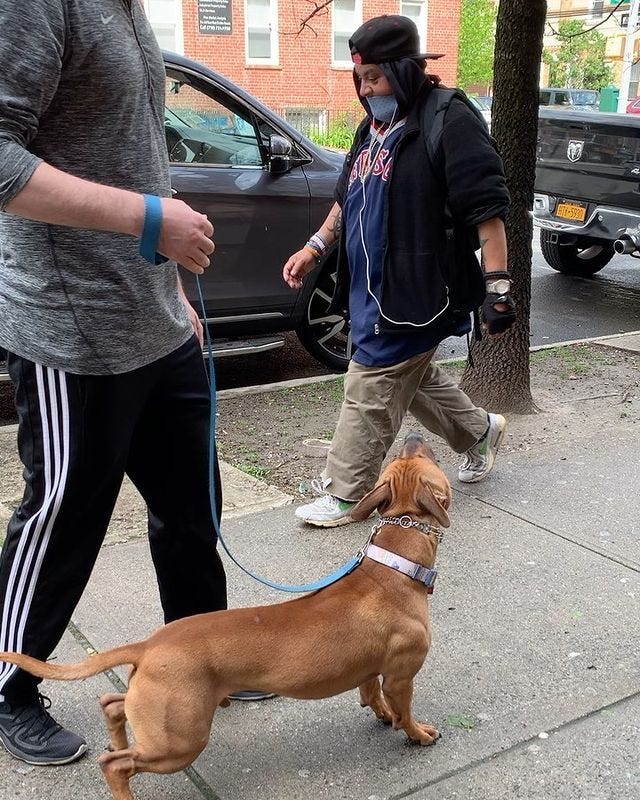Crisis averted
In this edition: wolf erotica, Y2K, remote work, Step Chickens, the Most Online country and Trump vs. social media.
I feel a little bit like an idiot, sending this today. (And many days, frankly!!) Feels both glib and out-of-touch to blather on about “internet culture” when people are literally fighting and dying and arresting reporters in the streets. Nonetheless, I’m pasting below the newsletter as it was drafted late last night, in the hopes it gives you a breather or at least something else to think about. We’ll close with a link to the Minnesota Freedom Fund. Now back to your regularly scheduled program!
In the year leading up to the new millennium, Laurence Taylor traveled to 20 countries
all across Europe. His work, at the time, involved applying patches and updating code for a global company’s Windows NT4 and 95 computers. After the staff in each office left for the day, Taylor and a fellow programmer would swoop in for overnight upgrades, carefully fixing the code that might cause the system to crash or malfunction in 2000. When midnight struck on the last day of December, 1999, Taylor was pleased, but not surprised, to see that work pay off: Y2K never happened, at least not to the extent many feared it would.
But in the two decades since, Taylor and hundreds of programmers and engineers like him have found themselves fighting a surreal second battle: convincing legions of skeptics they had won a war, that they didn’t invent the enemy. As the Times put it on January 1, 2000, “was the threat of technology failure overstated, or did spending hundreds of billions of dollars to fix things avert a catastrophe?”
Such questions probably sound familiar to anyone following Covid-19 news (… or interacting with a certain type of maddening relation). The parallels were obvious to Taylor, too, and to the technologist Lisabeth Laiken, who both tweeted about the overlap earlier this week. That got me thinking about it.


Full disclosure: I very much believed Y2K wasn’t “a thing” until I read the replies to this tweet (they’re fascinating, in full). I was a kid in 2000, and grew up with the impression that Y2K was little more than my godmother’s kooky excuse for stockpiling canned goods and paper towels. Now I wonder how today’s eight- and nine- and 10-year-olds will remember this period: as a moment of mass hysteria and exaggeration — or a crisis averted? Media coverage and education will matter. But it’s unclear how much.
“An image of ruins is always more striking than an image of hundreds of computer programmers diligently fixing COBOL code,” Zachary Loeb, a scholar who researches the history of technology, told me by email. “Overcoming this is very difficult, largely because it has a lot to do with larger social issues” — like poor understandings of risk and hazard, and a general bias toward best-case scenarios.
To be clear, Loeb said he realized a computer bug is not at all the same as a pandemic. But they’re both examples of what he calls “post-event denialism,” a sort of survivorship bias in which people assume, because the worst didn’t happen, that the threat itself was exaggerated. Here’s more:
“Many people are taking the position of ‘the hospitals weren’t totally overwhelmed, millions haven’t died, this is all a hoax!’ But what they’re failing to realize is that the reason the hospitals weren’t totally overwhelmed and the reason why millions haven’t died is because of all of the steps that were being taken (and, of course, over a hundred thousand people have died even with all of those steps having been taken).
I think that what Y2K can teach us about COVID-19 is that it’s important to trust the experts, that it’s important to appreciate the unseen work that is being done to prevent the catastrophe from happening, and that success in mitigating a disaster is often seen as proof that the threat wasn’t real.”
Of course, people who don’t know history are doomed to repeat it, etc. You can read more from Loeb about Y2K here.
Links you can use
A good social game for when Hangouts gets old: Buzzfeed Quiz Party lets you take the site’s quizzes with other people.
A very thorough guide to current streaming services: from Starz and HBO to their Korean equivalents.
A long list of curated things to do/see/cook/sing/read at home: Yes, I know this is basically Dropbox sponsored content, but — Wendy MacNaughton! Roxane Gay! It’s fun.
If you read anything this weekend
This story has it all: wolf erotica, legal drama, unexpected musings on the nature of online authorship… and to think it ALL STARTED with “rough, wolfish sex.” (Almost made this the subject line, figured some of you wouldn’t like it!) [New York Times]
“Don’t trust anyone who gets rich during a pandemic.” Big tech has prospered in the past two months — but that’s reason for more scrutiny, not less. [The New Republic]
Bill Gates conspiracies are having their moment. From the obscure “Rebecca Project” to Italian parliament. [Buzzfeed]
The pandemic has changed porn, maybe for the better. New platforms (and stay-at-home rules) have prompted performers to make their work more personal. [The Ringer]
How Estonia got Very Online, well before Covid. The tiny country didn’t struggle to adopt online schooling or telehealth, because it already used them. [The Atlantic]
Postscripts
Step Chickens. Summer feelings. Priests with water guns. A scourge on the mommy YouTuber who “returned” her adopted son. Why being online together often feels so lonely. How Instacart’s sick pay (doesn’t) work. The many problems with working remotely. (Not mentioned: Zoom meetings are the worst!!)
Classical musicians vs. copyright bots. Twitter vs. Trump. Also: Twitter vs. Facebook; Trump vs. the internet; and this poor Twitter employee vs. Fox. The return of the virtual “knowledge commons.” The glory days of Amazon. Last, and very arguably least: “I got stabbed because of my Instagram.”


Thanks again for subscribing to Links. Sincerely: I appreciate it!! This takes me rather a long time to put together each week, so if you liked this edition please consider H/Ting or forwarding to a friend.
— Caitlin



